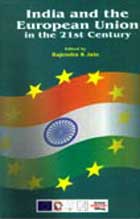Joint EU-India Vision Statement on Development of the Information Society and Information and Communication Technology New Delhi
- 23rd November 2001
- 23rd November 2001
- Information and Communication Technologies (ICTs) are the driving
forces behind the creation of the global Information Society in the XXI°
century. With their potential for making possible new applications and
services, ICTs are emerging as a key tool for economic growth and
development for all countries, including those engaged in the process
of building their economies and consolidating the gains of development.
We recognise that ICTs can play a significant role in the development
of society, particularly by raising prosperity and economic productivity,
therefore we agree to jointly work towards further developing our
respective Information Societies.
- At the start of the new century we reaffirm our commitment to further
strengthen our substantive and growing economic partnership. Both are
characterised by large geographical size, cultural and linguistic
diversity, and vibrant civil societies.
- India, the world’ largest democracy and home to one billion people is
also emerging as a leader in the field of knowledge-based industry,
especially in information technology.
- The EU is focussing on the Information Society as a substantive
point of political action in order to ensure that its industry and
citizens benefit fully from the new opportunities. Therefore, the
eEurope Action Plan was launched by the European Council in June
2000 with the objective to make the European Union by 2010 "the most
competitive and dynamic knowledge-based economy in the world".
- The EU remains the largest market for Indian exporters with trade
growing considerably in the past few years. However, given the size
of our respective economies the potential for further enhancing trade
and investment is significant. In this context, ICT in particular, is
a promising area for a mutually beneficial co-operation between the
EU and India.
- India-EU economic co-operation in the ICT sector could provide for
co-operation across a broad spectrum of business and non-business
areas: from horizontal actions such as policy formulation, government
initiatives, standards and regulatory issues, sector-specific projects,
business and industrial management initiatives, to science and
technology programmes. The essential benefit of such co-operation
lies with greater private sector and civil society involvement in
projects/programmes based on mutual interest, that catalyse and
foster business-to-business relationships and bring benefits to local
communities and grass-root development.
- Both India and the EU attach importance to the effective liberalisation
of the markets for electronic communications, notably building on the
Agreement on Information Technology and the GATS/WTO Agreement on Basic
Telecommunications Services. This will generate increased competition
and thereby develop markets, extend consumer choice, improve quality
and variety of services, decrease prices, and enable Information
Society services, notably e-commerce.
- Our co-operation dialogue will take place in the framework of the
recently established EU-India Working Group on the Information Society.
This dialogue will address but not be limited to the following
subjects:
a) Policy and regulatory frameworks, and their implementation aimed at creating an appropriate environment for the development of the Information Society, notably by improving the infrastructure and by facilitating access;
b) Enhanced human capacity development, knowledge creation and sharing, including training of trainers in IT related fields;
c) Promotion of e-Commerce with focus on SMEs;
d) Intensified co-operation in the framework of international organisations and fora dealing with Information Society issues;
e) Promoting RTD co-operation in the fields of Information Society Technologies,
f) Interconnection of the research communities and networks. - We will further consider joint co-operative actions involving
government and administrations, the private sector, and civil
society. Such actions could address areas such as policy
formulation and exchanges of regulatory practice, network
security, cybercrime and critical infrastructure protection;
standardisation, and pilot projects in the social priority
sectors, such as in health, education, and "government on line".
Source: http://europa.eu.int/comm/external_relations/india/sum11_01/stat_infso.htm







